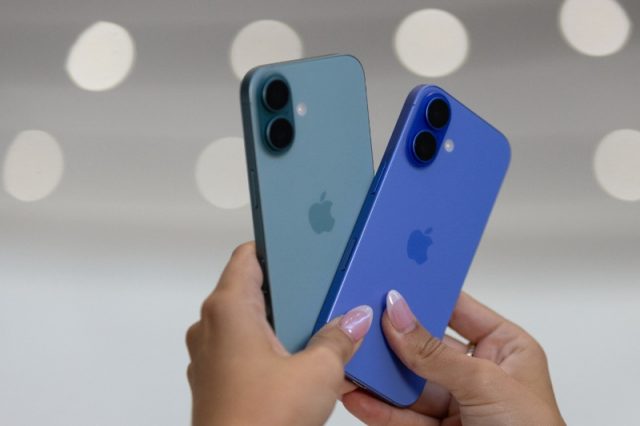
- IPhone 16 is first Apple smartphone designed around AI features
- Huawei to officially announce new products after Apple’s event
- Google has showcased AI features to challenge Apple’s dominance
CUPERTINO, California — Apple AAPL.O on Monday unveiled its long-awaited, artificial intelligence-boosted iPhone 16 and promised improvements in its Siri personal assistant as it rolled out new software, beginning in test mode next month.
“The next generation of iPhone has been designed for Apple Intelligence from the ground up. It marks the beginning of an exciting new era,” Chief Executive Tim Cook said at a product launch.
Shares of Apple closed barely changed for the day at $220.91. Apple’s event came hours before China’s Huawei HWT.UL launches a tri-fold phone, underscoring the competitive challenge the iPhone maker faces. Apple has yet to announce an AI partner in China to power the 16s.
Apple and technology companies around the world are racing to add AI to products, and phones are expected to be among the most important battlegrounds. The Cupertino, California-based company also is betting the AI feature will drive consumers to upgrade amid a slowdown in iPhone sales.
Apple Intelligence, the company’s AI software, will be used to improve Siri as well as enhancing features such as understanding and identifying objects captured by the phone camera, executives said.
A test version of Apple Intelligence will be available in the U.S. version of the English language next month. It will be available for other localized versions of English in December, with versions in languages including Chinese, French, Japanese and Spanish next year. Features including improvements to Siri will be rolled out over time, Apple said. It did not say, however, when it would move beyond test.
The iPhone 16 and 16 Plus will cost the same as models they replace and use a new chip and an aluminum case. A customizable button that can control the camera was one of the most touted hardware features in a format that looks similar to previous models.
The higher-end 16 Pro and 16 Pro Max are made from titanium and have more AI capability, such as offering suggestions on how to set up a photo shoot more effectively and audio-editing capabilities aimed at professional-level video production.
Apple’s new iPhone chips use the latest version of Arm’s ARM.O architecture that includes specific features to speed AI applications.
“Existing iPhone users who have had their device for 3-4 years will definitely be enticed to upgrade, even if some things are rolling out later, as this will future-proof their device for AI,” said International Data Corp analyst Nabila Popal.
Still, several analysts described the delays in features as keeping many potential buyers on the sidelines initially.
“You might see people wait a little bit to see how these things work out, how well they function, and then they’ll start to investigate it. But I don’t think we’ll see the mad rush that we’ve seen in years past,” said TECHnalysis Research founder Bob O’Donnell.
By comparison, Huawei’s website showed on Monday that it had garnered more than 3 million pre-orders for its Z-shaped tri-fold phone ahead of its official unveiling. This underscores Huawei’s ability to navigate U.S. sanctions and solidifies its position against Apple in China, where consumers are hankering for more AI features and are willing to pay for them.
WATCHES AND AIRPODS
Apple also unveiled new Watches and AirPods with health-focused capabilities, as well as hardware-design improvements. Apple highlighted the Watch’s ability to discover longer-term health conditions such as sleep apnea as well as detecting and responding to emergencies such as a fall.
As it updated AirPods, Apple rolled out hearing-aid features that it has submitted for U.S. regulatory review.
Apple fans globally have been waiting to see the new phones with AI. IPhones accounted for more than half of Apple’s $383 billion sales last year.
“While Android phones may have some of these features, Apple has packaged them well and will be able to market them far more broadly,” said D.A. Davidson analyst Gil Luria.
China offers particular challenges to Apple.
“Apple fell out of the list of top five smartphone vendors in China in Q2,” said eMarketer senior technology analyst Gadjo Sevilla. “It was the first time that China’s domestic smartphone firms held all five spots. Since Apple Intelligence still needs to be approved by Beijing for a rollout in China, it will likely not initially be a key driver for adoption in the region.”
In China, Apple aggressively slashed prices earlier this year, prompted by government restrictions and increased domestic competition.
The iPhone 16 lineup is the first Apple smartphones designed around these AI features though those are expected also to be available on iPhone 15 Pro and Pro Max, the top-end versions of the previous-generation devices.
Rivals including Alphabet’s GOOGL.O Google are also showcasing AI features to try to upend Apple’s dominance in the high-end smartphone market.
Google, developer of the Android operating system which competes with Apple’s iOS, focused its Pixel smartphone rollout event in August on AI features including Gemini Live, which allows users to hold live voice conversations with a digital assistant. Many of the AI features Google announced were also rolled out to the Android-based devices made by manufacturers such as Samsung 005930.KS and Motorola MSI.N.
In June, one week after its developer conference, Apple said it would delay the release of AI-powered features in Europe due to European Union tech rules.
Huawei has scheduled an official announcement of its Mate XT Z-fold phone on Tuesday in China.
—Reporting by Max Cherney in Cupertino, California, and Kenrick Cai in San Francisco; additional reporting by Yuvraj Malik, Arsheeya Bajwa, Aatrayee Chatterjee, L Unnamalai and Zaheer Kachwala in Bengaluru; Writing by Peter Henderson; Editing by Kenneth Li and Matthew Lewis









